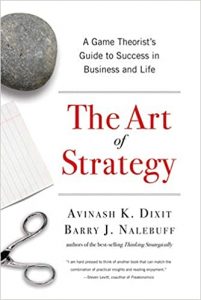
-Game theory is the science of predicting the outcome of a situation or game by understanding the risks and rewards associated with each decision. It can be used to effectively identify the best possible strategy/tactic for a goal.
-The book is based on extensive research and is also paralleled with unique real-life examples to put the usage of game theory into perspective in different business scenarios.
-The most significant emphasis in this book is on the idea of “Anticipation of Situation.” The approach is that there is always a mathematical formula that will predict the final outcome of a game.
-Studying competition and their reaction to different situations allows one to equalize or even reach the top spot.
The 3 main GAME THEORIES you should consider when making important decisions:
1. The Decision Theory —
This method requires someone to analyse all possible outcomes before reaching a conclusion. It will push the person to consider all of the factors associated with a scenario and envision how they will be played out in the end. The decision-maker needs to be open to all ideas and possibilities.
2. The General Equilibrium Theory —
While this is used extensively in macroeconomics to analyze stock markets and exchange rates, it can also prove useful when applied to other business ideas and concepts.
3. The Mechanism Design Theory —
In this theory, the person understands all of the rules of the game, but questions their usefulness as to whether or not they are helping or harming the outcome. Using this theory, the person often will be required to produce their own set of rules that will give them the outcomes they are looking for.
The 3 ways GAME THEORY serves in the business environment are:
1. It reduces business risk –
When implemented correctly, game theory can benefit in creating the best pricing structure and strategies, proposed market shares and income expectations. It can help understand the customers and their decision making processes better.
2. Helps to understand the competition –
Understanding everything about the competition is very important. By using game theory, you will gain more insight into the competition than before like knowing their weaknesses and strengths. The more knowledge that is assembled about the competition, the better the outcome.
3. Helps with the decision-making process –
The best game players know and understand the importance of research when it comes to making any decision. Smart business leaders will brainstorm every possible outcome before reaching any definitive conclusions.
# Key Takeaways:
– The importance of understanding the fundamentals of strategy, including the difference between strategy and tactics, and the role of uncertainty and risk in decision making.
– The concept of “game theory” and how it can be applied to strategic decision making.
– The importance of understanding and analyzing your own strengths and weaknesses, as well as those of your competitors.
– The role of innovation and creativity in developing successful strategies.
– The importance of adaptability and flexibility in a constantly changing business environment.
# Practical Application:
The concepts and strategies outlined in The Art of Strategy can be practically applied in real-world scenarios by:
– Conducting a thorough analysis of the market and competition before making any strategic decisions.
– Using game theory to anticipate and respond to the actions of competitors.
– Continuously evaluating and adapting strategies based on changing market conditions.
– Encouraging innovation and creativity within the organization to develop unique and effective strategies.
– Developing contingency plans to mitigate risks and uncertainties.
# Valuable Insights for Leaders and Managers:
– Chapter 2: “The Fundamentals of Strategy” provides a solid foundation for understanding the key principles of strategy.
– Chapter 4: “Game Theory and Strategic Thinking” offers valuable insights on how to analyze and respond to competitive situations.
– Chapter 6: “Innovation and Strategy” highlights the importance of creativity and innovation in developing successful strategies.
– Chapter 8: “Adaptability and Flexibility” emphasizes the need for organizations to be adaptable and flexible in order to thrive in a constantly changing business environment.
# Case Studies and Examples:
– The case study of Southwest Airlines in Chapter 6 effectively illustrates the importance of innovation and differentiation in developing a successful strategy.
– The example of the “prisoner’s dilemma” in Chapter 4 effectively demonstrates the application of game theory in strategic decision making.
– The case study of Netflix in Chapter 8 showcases the importance of adaptability and flexibility in responding to market changes.
Leave a Reply